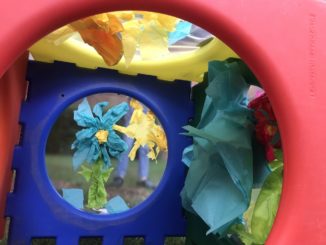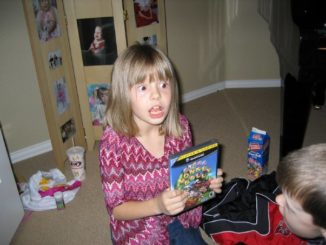“Did you know,” he tells me, his feet kicking off the ground to push the swing again, “that if you wake up before 3 AM, there’s a 1 in 3 chance it’s because you heard somebody breaking into your house?”
“Hmmm,” I answer reflexively. I’m sitting on the floor with my knees up, facing in his direction, neither of us looking directly at one another. Just looking at something else in the room. Eyes not taking in input, really; we’re focused on what we’re saying, communicating. “I think it would scare me if I had heard that before.”
He shrugs. He’s full of pseudo-statistics like this. He tells me new ones every time I see him, and all of them are logically nonsensical.
“I heard that if you go outside barefoot in Europe then you’re stepping on the bones of at least one hundred dead people with every step, because that’s how many people have died everywhere.” (As explanation for why, despite loving being barefoot, he can’t tolerate going barefoot in an outdoor environment.)
“Did you know that if you graduate college then it’s more likely that you just live with your parents and you can’t even get a job because there are half as many jobs as people?” (As anxiety around his future and his own family environment.)
“More people die from serial killers than any other thing.” (As explanation for his own fascination with horror movies and games.)
And a 33% chance of your house being broken into followed from an explanation of why he is so tired today: because he woke up before 3 AM, followed by that “statistic”. Which suggests to me, even if he doesn’t outright say it, that he probably lay awake for who knows how long, worrying worries that don’t belong in little boys’ minds, worrying that maybe somebody broke into his house, wondering if each little sound he heard was the sound of an intruder. And without a way to make sense of that anxiety, he turned it into something that echoes the sound of a fact, even without the bones of a fact to actually back it up.
When we first started meeting, he used to get angry at his own brain more often for the way it would lose thoughts, for the struggles he sometimes has to put things to language. He’s not as angry anymore, or at least he’s not saying it out loud, it’s not showing on his face. When he loses what he was going to say, we wait until he finds it again, or I help prompt him through it, or we move on to something else. When he says things in ways that wouldn’t be well-received by other adults or maybe by peers, sometimes he still glances at me in anxiety that I’m going to scold him for what he’s just said. I always reassure him that I don’t mind, but agree that maybe that isn’t the right way to say it to a teacher who will be bothered by it.
I don’t contradict his false statistics. I talk with him through the feeling that’s living underneath them. When my coworker says “It’s a billion degrees outside,” I don’t tell her that it’s not and that that’s illogical, I agree that it’s way too hot. When little kids tell me that they have one thousand muscles, I don’t correct them on their anatomical knowledge, I compliment their shown-off biceps. And I hear this the same way.
“I will never go to freakin’ America,” he tells me. “They let everybody have guns. They’re allowed to bring them to school and I think 1/4 of people die because they get shot.”
I think the words stop my heart for a moment. I forget how to say anything. I’m thankful that my first response is usually a slow, “Hmmm,” because that’s about all I can offer here, too.
I’m thinking of another time, another child, another continent, another situation entirely. I’m thinking of kids stage-whispering to one another in the hallways outside my room, unaware of how loud they echo. “I heard that half of everyone who gets covid dies.” “I heard that twice as many boys get covid as girls.” “I heard that 99% of New York has covid already.”
Anxious whispers, the day before spring break. I actually smiled at them. The things kids say and how little they know. Empathetically, of course — I didn’t want them to be anxious nor take joy in their anxiety — but I really, really believed in their naïveté.
The day before the spring break where the world shut down around us.
I didn’t correct them out loud, back then — only in my own mind, my own mind where I knew everything, my own mind where I knew the world was the safe and predictable place for adults that it’s always been. Except it’s not, and it hasn’t been, and it wasn’t even then.
I don’t correct him out loud, now. Not even in my own mind.
The whole world can fall apart around us, but you’re too young to have to know that. I was in my twenties before I found that out. That’s all I could say, and I won’t, because he deserves more than me glossing over what’s been his entire remembered childhood.
I don’t have an end to this post or this story. In one sense: too many have ended already. In a different sense: it just feels like it never ends.



